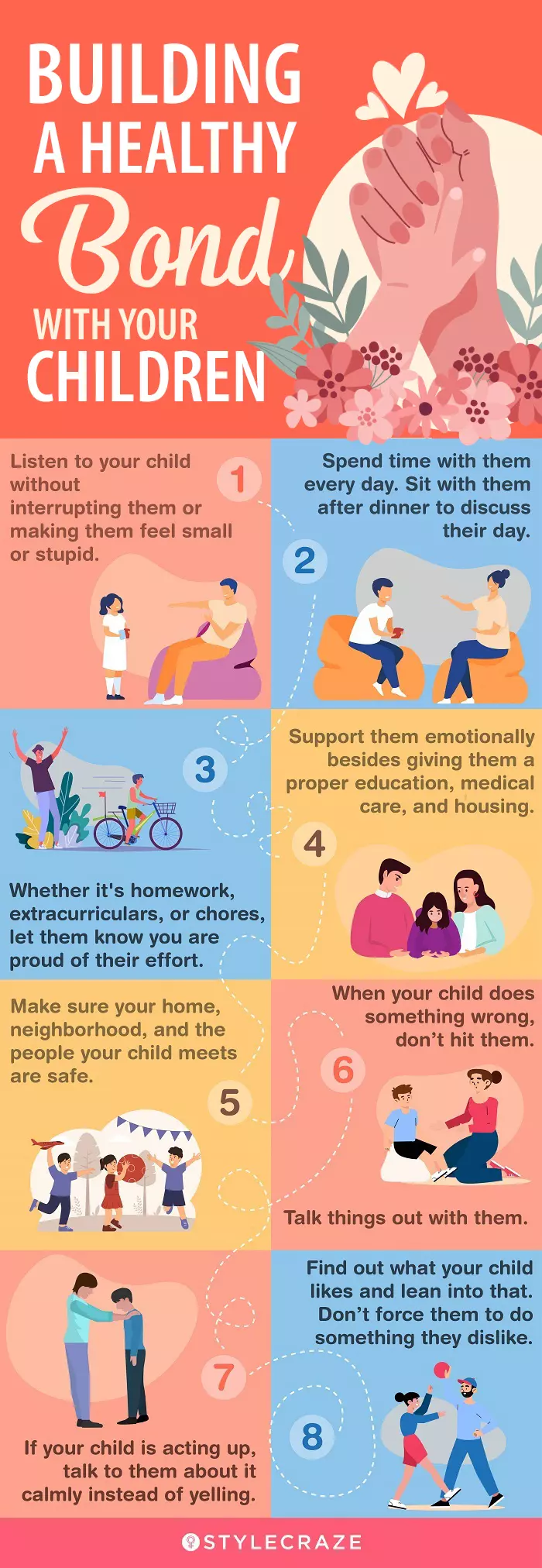11 Reasons Grown Children Ignore Their Parents & What To Do
Learn how to respond the right way when your children avoid communication with you.

Image: Midjourney/ StyleCraze Design Team
You may witness grown children who ignore their parents. This implies parent-child relationships can sometimes become complex. Some children may grow up feeling disconnected from their parents. In addition, many serious factors, such as generational gaps, abuse, family conflict, and unhealthy mental states, may lead to strained relationships between parents and children. Identifying and effectively addressing these causes is essential to build healthier and stronger bonds. In this article, we dive deeper into these causes to help improve the relationship between grown children and their parents. Read on for more details.
In This Article
Why Do Grown Children Ignore Their Parents?

1. Abuse And Neglect
Children who have experienced abuse from their family or relatives tend to grow apart from them. The abuse can be verbal, psychological, sexual, or physical. Research says that even neglect is a kind of child abuse (1). Parental neglect can make a child feel very isolated.
Effect: The consequences of abuse and neglect can be long-lasting. If both parents are working or busy with their lives, neglecting the children’s needs, a rift may form between them and their children. Emotional unavailability is another form of neglect, which can make the children feel estranged from their parents. If you have abused or neglected your child, they might feel angry, resentful, and bitter towards you. Child abuse and neglect can lead to psychological issues, such as depression, low self-esteem, and difficulty in maintaining relationships. The abused child often feels isolated, fearful, and distrustful. Children can also develop attachment disorders due to abuse and neglect, which hinder their ability to form healthy peer, social, and romantic relationships. They are also more likely to develop antisocial traits as they grow up.
Solution
- Actively listen to your children and acknowledge their feelings. Notice their emotional changes and make small gestures to assure them of your love and care. If they are resentful, try to understand why they are feeling that way, as it can be because something happened with friends or maybe something happened in school. Listen to their issue patiently, and reassure them that you are there and standing with them in that feeling.
- Create a space for healthy communication with your children. Instead of resorting to abuse or shouting, empower yourself with constructive criticism and positive reinforcement. This approach will not only help your children understand their mistakes but also empower you as a parent, making you feel effective and in control.
- Set realistic expectations for your children and take the time to celebrate their small achievements. Remember, unrealistic demands can lead to failures, which can cause frustration. So, let’s focus on the positive, be proud of their efforts, and encourage a positive outlook.
- Attend to their needs promptly and allow them to share their issues without fear of judgment. Foster a sense of belonging with your children and nurture them with love and honest affection.
Note: Remember, taking care of yourself is also important. When you’re well-rested and emotionally balanced, you can be a better parent.
2. Difference In Opinions
A consistent difference in opinions and values due to the generational gap may lead the children to grow apart from their parents and cause a communication breakdown.
Political opinions, gender rights, career expectations, and age-old values are common grounds for differences in opinions between children and their parents. It is how we communicate differences that matter. We can validate others without agreeing with their viewpoint.
When the values are not aligned, conflict can arise. If your child believes they cannot openly discuss their opinions with you, this is a sign there is already a fracture. You perhaps were emotionally disapproving or dismissing.
Effect: When parents dismiss their children’s opinions and disregard their perspectives, children stop sharing their thoughts altogether. They inadvertently discourage open communication. This communication breakdown can develop trust issues and misunderstandings. When conversations become purely obligatory, the parent-child relationship becomes strained. Children may develop a rebellious attitude towards their parents and harbor resentment. In many cases, when parents do not value their children’s opinions, it can negatively impact their sense of self-worth and lead them to struggle with their identity.
Solution
- Parents must value their children’s opinions, as it empowers them to foster healthy communication and relationships. Encourage your child to share their views openly, pay attention to their words, and show honest curiosity about their opinions.
- Validate their emotions and show respect for their opinions even if you don’t agree with them. This approach helps foster mutual understanding and trust.
- Be open to learning new perspectives and acknowledge the generational gap with empathy. This reveals your understanding and appreciation for the new generation and eagerness to understand their ways, fostering a more empathetic and harmonious relationship.
- Do not emphasize differences. Instead, highlight the common grounds and develop emotional closeness.
- Motivate your child to explore their individuality and utilize their mind before making a decision. This will not only enhance their self-worth and boost their confidence level but also make them feel supported and nurtured in their journey of self-discovery.
3. Controlling Parents
Being controlling or coercive towards your children is a type of abuse and a classic trait of a toxic mother or father.
Effect: If the child feels too constrained by their parents, they may grow distant from family and relatives. They will always feel intimated and never gain assurance in their actions. Parents who control their children’s freedom and overall life hinder the child’s personal growth and experience. Forcing your child to stay home when you want them to or do things they are not interested in will take them away from you. Constant control can lead them to have low self-esteem. This will negatively impact their decision-making ability. If a child lives under constant scrutiny, they develop severe stress and anxiety problems. This will delay their emotional maturity as they will always fear making mistakes and won’t take chances to explore new things.
Solution
- Give your children enough space to hang out with their good buddies, participate in extracurricular activities, and do the things they love. This will encourage their independence and allow them to explore their capabilities.
- Offer essential advice and support instead of always preaching what they need to do. Talk them through the benefits and consequences of particular things, but let them decide what they wish to do.
- Set healthy boundaries and respect the terms to let them enjoy their independence. Respecting their privacy is crucial as it fosters trust and understanding, making them feel more secure and respected.
- Encourage your child to take healthy risks, but inform them about the possible outcomes. This will help build their resilience and self-confidence, empowering you as a parent to guide them through life’s challenges.
4. Lack Of Support
If parents do not support something their child loves, it may cause a tear in the relationship. This resentment may grow over the years if not dealt with soon. It is important for parents to support their children’s hobbies, likes, dreams, and interests. Even if the parent does not agree with their children’s passion or opinion, showing support goes a long way in building a strong relationship.
Effect: A lack of support can fracture emotional safety and emotional connection. Supporting your child can help foster a deeper relationship, provided that the interests, passions, and pastimes do not revolve around unsafe pursuits. Finding ways to support your child can be challenging when a lack of empathy is brought on by basic differences in beliefs. The lack of parental support can have serious consequences, making children feel unloved. This deteriorates their sense of self-worth and forces them to doubt their capabilities. Children who yearn for parental support but fail to get that, experience severe mental issues like anxiety and depression. It also weakens their ability to build meaningful relationships with other people and weakens their confidence levels drastically. Unsupportive children show signs of poor communication skills and decision-making abilities.
Solution
- Show unconditional love and support to your child despite everything. Use verbal affirmations such as ‘I believe in you’ or ‘You can do it’ to boost their confidence.
- Show support towards their choices and be their best cheerleaders. Celebrate their efforts instead of focusing solely on their success.
- Encourage their passions by helping them find opportunities to pursue them. Provide them with the necessary resources, such as art supplies or sports equipment, to tell them you are at their side no matter what.
- Provide emotional support when they feel low and motivate them during challenges to help them come out of the negative phase.
5. Unsafe Environment
Placing your child in an unsafe environment may cause cracks in your relationship with them. This could be a one-time instance, or the kind of people you let into your house may be unsafe for your child.
An example of an unsafe environment is residential instability – you constantly change houses. If you move around a lot, your child might feel less connected to the house and parents. The same goes for the environment inside the house. If one of the parents is an alcoholic or abusive, the children are less likely to bond with them.
As humans, we need stability and structure to know that our lives will offer safety and reliability. Children crave this and it is essential to their overall development.
Other unsafe environments include constantly changing your children’s care-givers, keeping your children with physically, verbally, or sexually abusive relatives or friends, or forcing your children to visit schools or parks where they are constantly bullied.
Effect: Unsafe environments can create constant fear in children, leading them to develop anxiety. This can make them emotionally unstable and face trouble in developing emotional connections with anybody. The impact of unsafe environments on children’s emotional stability is a cause for concern. These environments do not let children thrive and compel them to stay in their shells. This weakens their risk-taking ability and makes them feel powerless. Lastly, children who were brought up in an unsafe environment fail to interact freely with others and become socially awkward and isolated.
Solution
- Provide a safe environment for your children to thrive and develop healthy behavior patterns.
- Be mindful of the people you let in your house. Ask your children whether they like the guests or not.
- Minimize frequent changes of residencies if possible. When you do, talk to your child about the benefits of the change.
- Encourage your child to share their problems openly and provide adept guidance on how to tackle problems.
- When it comes to caregivers, parents should take a proactive approach and choose people who are reliable, emotionally stable, and experienced. This is crucial as it directly impacts a child’s safety and well-being. By avoiding exposure to potentially harmful individuals, parents can further contribute to creating a safe environment for their children.
6. Family Expectations
Some families hold their children to unrealistic expectations, which often makes the kids depleted and resentful. For instance, if a mother forces her son to take up a particular course of life or job that he doesn’t like, it may lead him away from her. This may also lead to a toxic mother-and-son relationship. The parents may expect the child to follow their political, gender, religious, and cultural views, which the child may not agree with.
Effect: The burden of expectations can create a gap between the child and their parents. Instead of discussing the difference of opinions and showing support and love, if the parents brush them away, it will make the child resentful towards them. Your child may think your views are outdated, forcing them to submit will lead to estrangement. Besides, if you constantly push them to adopt your ideologies, your child may struggle with forming a personal identity. Children may think twice before doing what they wish and fear disappointing their parents at every step. They may start believing that they are unworthy and always seek external validation. In the worst-case scenario, they may fail to add fuel to their creative mindset and never explore their individuality.
Solution
- Recognize that your child is an individual with different passions and hobbies. Encourage them to pursue their interests and explore different activities.
- Do not make decisions for them. Instead, let them make their own choices and support them throughout. This can build their confidence.
- Help them set achievable goals, not unrealistic ones. Support them in their journey towards their goals and celebrate their efforts.
- Make room for failure and teach them it is just a part of life. Push them to take failure as a lesson and improve their shortcomings.
7. Mental Health Issues
Mental health issues can often lead children away from their parents. If parents don’t understand or accept mental issues, it becomes difficult for the children to communicate with them.
Some parents take the ‘tough love’ route, forcing the child to deal with their mental struggles incorrectly instead of seeking professional help. If a child is bullied at school, some parents may think they need to go through that bullying to ‘be a man’.
Effect: This may impact the child’s mental state even more and negatively affect the parent-child relationship. The child may start withdrawing themselves from their parents, leading to complete isolation. If parents dismiss their child’s mental issues, it can trigger distress, making your children feel unsupported. Some children can harbor deep resentment towards their parents, while some can resort to self-harm. When parents fail to acknowledge the mental health problems and fail to find solutions, children develop trust issues. They may also fail to rely on authoritative figures later in life.
Solution
- Educate yourself about mental health issues and identify the symptoms in your child.
- Acknowledge their feelings and create an open space for discussions to learn about their problems.
- Do not shame them for showing their outburst of emotions. Instead, offer help and reassurance to foster trust.
- Seek professional help who can address your child’s problems and suggest solutions to manage the issues.
- Be always emotionally available for your child to let them come to you for help.
8. Traumatic Events
Witnessing traumatic events, such as sexual assault, abuse, or alcoholic parents, may lead children to separate from the family.
Effect: If the child tries to share their traumatic experience with the parents and they invalidate their emotions or refuse to accept, it causes a rift between them. This can have a devastating lifelong impact on your child’s psychological, emotional, mental, and physical health.
Solution
- By acknowledging your child’s feelings and validating their emotions with statements like ‘I understand you’ or ‘I can feel how hard it has been for you,’ you are laying the foundation for their long-term emotional well-being.
- Showing empathy and actively engaging with your child to assure them of your support is a powerful gesture that strengthens your bond and makes them feel understood and secured.
- Encourage them to share their feelings freely and disclose their vulnerable emotions to foster relatability.
- Apologize honestly for your past indifference if you have neglected their emotions.
- Show consistent support during their healing process and respect their decisions if they need space.
9. Divorce
In most cases, when parents get divorced, they get 50/50 custody of the child unless the court says otherwise. However, if they do not take their parental rights and responsibilities seriously, the children may fall apart from one or both of the parents.
Effect: If the child views one of the parents as the reason for the divorce, they might find that parent the “bad one” who disrupted their family. Also, if a parent remarries after divorce, it may cause an estranged relationship with the child if they do not like the new partner. These family dynamics may affect the child’s mental health deeply and cause problems like heightened anxiety and clinical depression. Children may also develop attachment issues in the future. They won’t be able to develop meaningful bonds as they will fail to trust people. They can be burdened with resentment and jealousy if they have strained relationships with their step-parents.
Solution
- Create an open space for communication with your child. Clearly state your reasons for separation to your children and reassure them that it will not impact your love for them.
- One parent must not blame the other in front of the child. Doing so will make it difficult for the child to maintain healthy connections with the parent.
- Be sensitive to the child’s needs after divorce and provide emotional guidance at all costs.
- Help your child find healthy outlets for emotional outbursts. Teach them the coping mechanisms and encourage them to express their feelings to find solutions.
- Maintain contact with your ex-partner and discuss ways to help your child come out of the unstable state. Co-parenting is effective in ensuring the positive growth of your children.
10. Favoritism Towards One Child
Sometimes, a child may feel unfairly treated by their parents if they show favoritism towards another child. This may lead the child to think that the parent prefers the other child over them.
Effect: When parents consistently side with one child during an argument, the other may develop feelings of resentment towards their sibling and the parents. This can lead to the harmful development of sibling rivalry, jealousy, and intense anger. While this favoritism may not be intentional, it can significantly impact the child’s self-esteem and mental growth. The child may feel alienated and struggle to trust others in their future relationships.
Solution
- Recognize the unconscious biases that may influence your behavior and actively work to control favoritism. This self-awareness and effort will help you treat both children equally, fostering a more harmonious family dynamic.
- Ensure to attend to both children individually and offer equal praises to both. Avoid comparing your children with each other, as this can foster feelings of inadequacy. Instead, use each child’s unique strengths as examples to motivate and encourage their individual growth.
- Teach both children the benefits of having shared interests. Address the perks of collaboration and encourage them to develop unity.
11. Career Demands
Demanding careers make it challenging for grown kids to maintain a close relationship with their parents. They have to devote most of their time towards their goals, which in this fast-paced life leaves little time and energy to pursue familial matters actively. Geographical distance exacerbates the issue, where parents and children who live in different states and countries cannot meet and spend time with each other on weekends and holidays.
Effect: This causes emotional distance between parents and the children. They feel neglected and develop a low sense of worth. It can also cause severe stress and anxiety issues. If parents are not present to help children deal with the problems, it can only increase their emotional distress. In the worst case scenario, the child may develop resentment and harsh bitterness towards their parents. They may also feel emotional insecurity and uncertainty.
Solution
- Prioritize the time spent with your children and engage in deep discussions about their feelings. Do not encourage any form of distractions during that time, as they can hinder the depth of the conversation.
- Schedule regular check-ins in the form of sit-in conversations, video calls, or phone calls. This allows the children to understand that their parents value them. They will look forward to the conversation.
- Set boundaries for work time and take family time seriously. Arrange certain family traditions or rituals. This will help the child connect deeply with their parents.
- Gift thoughtful presents to make your children feel special. Fulfill their needs by arranging their resources beforehand.
Here are a few signs that indicate your child is growing apart from you.
Key Takeaways
- Neglect and abuse in childhood, a wide difference in values and ideologies and divorce are some reasons why a child may ignore their parents after growing up.
- Behavior such as avoiding communication whether in person or over call or rare catch ups with no real sharing of what’s going on in their lives is often a sign that a grown child is ignoring their parents.
- While a relationship can’t be forcefully healed, parents can apologize for mistakes on their part, show acceptance and respect for their children and practice active listening when there is communication so that the relationship gets a chance to heal.
Signs That Your Child Is Ignoring You

- Break Of Contact: If your child doesn’t communicate with you either in person or over call, it can be a sign of estrangement. No matter how much you try to connect with your child if they do not respond, it indicates they do not feel connected with you. Also, if your child contacts you once a month with barely anything to say or share, may be they are ignoring you politely.
- No Interest In Family Events: If your child refuses to participate in family functions, they may be trying to stay away from you. This will cause a rift between your child and your relatives in the long run.
- Communicate More With Relatives Than You: If you are getting more information about your child from a relative rather than the child telling you, it is clear they may be ignoring you. If your child is not telling you about their achievements, new accomplishments, or big events in their life, they don’t feel connected with you.
- No Meetings: Your child may outrightly refuse to meet you, or they may constantly come up with excuses to not meet you. This is a clear sign that they are ignoring you. They might make time to meet other relatives, siblings, or friends, but they don’t make it a point to meet you. Even if they come to meet you, it’s only for a very short period. It could be that your child has set boundaries for the relationship but has not verbally communicated to you.
 Quick Tip
Quick TipOther signs your child is ignoring you is if they stop inviting you to events, forget to wish you on your birthday, and do not reply to your cards and gifts.
Are you wondering if your child is ignoring you or they are just busy? Read the next section to understand how often adult children usually talk to their parents.
How Often Do Adult Children Speak To Their Parents

Children in the launching stage of the family life cycle are now at the age where they are in the process of moving from living at home to forming their own identities and transitioning into living independently. Some adult children may speak to their parents at least daily or every alternate days. But this is mostly true for college kids rather than working adults. The frequency with which adult children contact their parents depends on their needs, schedules, and leisure.
Adult children with jobs, responsibilities, and families (spouse and children) may not call often. However, if your child keeps in touch with you and shares information about their lives, it implies they are not ignoring you. It can be an indicator that the relationship is healthy.
Now that you know the clear signs your child is ignoring you, here are a few ways to help you cope with it.
What Can You Do To Improve The Relationship?

- Apologize: A great first step is to process regrets with your child together and apologize for them. This allows them the opportunity to also process their resentments. Most of the time, parents refuse to apologize to their children. But an apology can go a long way in rebuilding your relationship with your kid. It is important to back your apology with actions. If your child thinks you are just all words but no action, it might worsen the situation.
- Listen: Instead of getting your child to listen to your opinion, listen to theirs. Being a good listener is more than just active listening. Listen to understand them deeply, empathize, and validate. Don’t interrupt them when they speak. Hear them out with an open mind. Talk to them about the things you don’t understand and listen to their answers.
- Accept: It is important for a child to know that their parents accept them for who they are. So, be more accepting and supportive towards your children. Try to accept people your child loves and things they are interested in.
Bebe Nicholson, a blogger, shared how her sons celebrate Mother’s Day with their wives and how she understands why it is important. She wrote, “My sons like to make sure their wives have a good Mother’s Day, and I realize they are in the trenches taking care of my grandchildren. One of my daughters-in-law likes to visit her mother on Mother’s Day, and since they live hundreds of miles away, this doesn’t lead to any jealous vibes from me (i).”
- Respect: Respect is earned; it is not freely given. Be it a father and son or a mom and daughter relationship, you have to respect your child’s opinions to earn their respect. Just because they are younger than you does not mean they have to listen to you and follow your beliefs. Your views on respect may differ from those of your child. Understanding their point of view could help in “earning” their respect in the long run, even though you may not necessarily agree with it. As children grow older, being considerate of their choices and lifestyle can also promote respect. For example, if they choose a career different from your expectations, then just express genuine interest and show openness to understanding them better.
- Do Not Exert Pressure: Stop pressurizing your child to do things they don’t want to. This includes education, career, and marriage. Don’t force them to talk to you as well. Just because you are their parent, it doesn’t entitle you to their respect and conversation. It has to be earned, and you need to be there for them.
- Encourage Open Dialogue: It is important to talk about feelings of resentment, so encourage open communication. Foster an environment where your child feels comfortable sharing their thoughts without fear of judgment.
- Seek Professional Help: If you have mental health issues causing the tear with your child, you need to seek help. You may also consider joining support groups where talking about your situation, challenges, and feelings can help you mentally cope with it. If your child is experiencing mental health issues, try to find a specialist who can explain your child’s situation to you. If your child is comfortable, get them to speak to a family therapist.
- Let Go: Sometimes, you have to realize that the bridge is burned. Your child has their own life now, and you have to let go of them. Forcing your way into your child’s life may work temporarily, but it often increases the rift. However, let them know that you are there if they ever want to talk or need anything, and just let them be. If your child continues to set boundaries and makes the decision to limit you in their life, use this opportunity to work on yourself to gain perspective on your unhealthy patterns that may have caused the strain in the relationship.
 Quick Tip
Quick TipAvoid emotionally blackmailing them and using hurtful words and phrases. This will cause you emotional distress. Remember, you can’t control whom they choose to be with or how they behave.
The next section will answer how soon you can expect to reconcile with your estranged child and what factors decide how long you will be kept cut off from their lives.
How Long Does The Estrangement Last?

Some estrangements may last for a few weeks to months. Some may be more serious, lasting for several years, depending on the cause of the estrangement. It also depends on what you do to make your child believe you want to repair the relationship. If you aren’t doing anything, it may never get repaired.
Parents need to take the first step and show support to rebuild the relationship. Don’t expect your child to make the first move; you do it. This will make your child realize that you are serious about them and go a long way in developing a strong and secured bond.
Infographic: Building A Healthy Bond With Your Children
How you treat your children when they are young is very important in determining how good or bad your bond with them will be when they grow up. Early understanding of family hierarchy and upholding a healthy family structure during growth are key to strengthening the connection.
You can follow certain pointers to make sure you build a strong, healthy, and beautiful bond with your child. Apart from loving them unconditionally, you need to support and encourage them.
Check out the infographic below to learn how you can build a healthy relationship with your child. Illustration: StyleCraze Design Team
Grown children who ignore their parents do so due to several factors. It is most often due to certain unmet expectations, abuse, or neglect. It could also be due to a prior traumatic experience, lack of support, or unrealistic family expectations. In certain cases when everything is fine, the mental health of the child affects the way he bonds and connects with his parents. Lack of communication or interest in family events may indicate that the grown up child is not keen about his parents.
Frequently Asked Questions
What is the most psychologically damaging thing you can say to a child?
There are several psychologically damaging things that parents can say to a child. But most importantly, “I don’t love you” or saying nothing at all seriously hurts your child.
How do you deal with a disrespectful grown daughter?
Engage with your daughter, acknowledge the mistake or hurt you may have caused, and also learn to set boundaries; these may help deal with a disrespectful grown daughter.
How do you let go of a child who hates you?
Try to listen to your child, letting them know how much love you have, and also try to change yourself to avoid the same mistake (if you begin communicating again).
Discover insights and unveil the compelling reasons your grown kids might harbor deep resentment towards you. Prepare yourself for eye-opening revelations. Watch this video!
Personal Experience: Source
StyleCraze's articles are interwoven with authentic personal narratives that provide depth and resonance to our content. Below are the sources of the personal accounts referenced in this article.
i. What if Your Children Ignore You on Mother’s Day?https://medium.com/the-partnered-pen/what-if-your-children-ignore-you-on-mothers-day-1ec9c405e3be
References
Articles on StyleCraze are backed by verified information from peer-reviewed and academic research papers, reputed organizations, research institutions, and medical associations to ensure accuracy and relevance. Read our editorial policy to learn more.
- Child Abuse in the Family: An Analytical Study
https://www.researchgate.net/publication/237494941_Child_Abuse_in_the_Family_An_Analytical_Study
Read full bio of Erin Williams
Read full bio of Sneha Tete
Read full bio of Subhrojyoti Mukherjee
Read full bio of Sangita Goel



























Community Experiences
Join the conversation and become a part of our empowering community! Share your stories, experiences, and insights to connect with other beauty, lifestyle, and health enthusiasts.